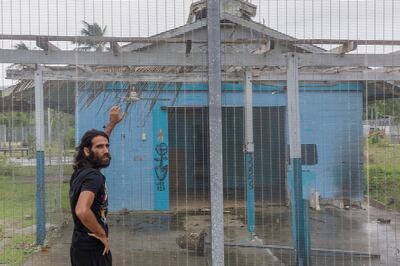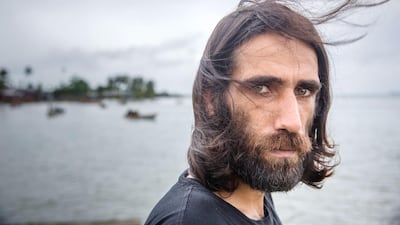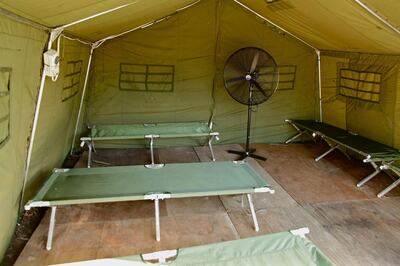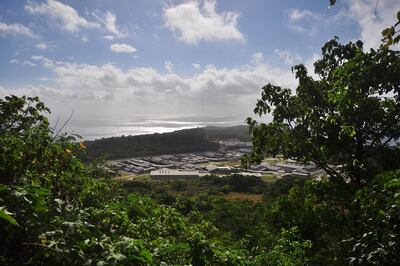Purgatory has many backdrops for Iranian-Kurdish refugee Behrouz Boochani. At first it was the waters off the coast of Indonesia. Then it was the confines of the detention centre on Manus Island. Now, it's exile "locked in a room" in Port Moresby, the capital of Papua New Guinea.
Whatever setting he has found himself in over the past six years, the circumstances of each have always been the same: waiting. Waiting for resettlement; waiting for answers.
After fleeing Iran and attempting to seek refuge in Australia, the writer and journalist spent six years in Australia's notorious offshore processing and detention system on Manus Island, Papua New Guinea, until it was closed last month – finally being deemed illegal after years of accusations of human rights abuses and poor treatment of asylum seekers.
Boochani wrote a book texting messages to a friend
The detention centres on Manus, Nauru and Christmas islands have long been a blight on Australia's conscience, a point of contention come election time, and the subject of scrutiny from international human rights campaigns. But perhaps none of the horrors that went on inside the centres would have made the global impact they did if it weren't for Boochani.
No Friend but the Mountains, Boochani's much-lauded book, was composed via text message from Manus to his friend Omid Tofighian, who translated the work into English from Farsi. The book recounts Boochani's journey from Indonesia to Australia by boat, and his ensuing imprisonment by the Australian government, which continues to refuse him entry. Incredibly, it's been a resounding success in the very country it criticises over its 400-odd pages.
It picked up A$125,000 (Dh312,000) at the country's richest literary prize, the Victorian Premier's Literary Awards; it won General Non-Fiction Book of the Year at the Australian Book Industry awards; it scooped a A$10,000 prize at the New South Wales Premier's Literary Awards and most recently, it was bestowed the National Biography award, worth A$25,000.

For most people, such a wealth of earnings would be enough to disappear into the sunset and start anew. But for Boochani, it provides little comfort. "I could have left three years ago, but I didn't want to use my privilege, I thought it was immoral to use that and leave. I can help people here. But now it's different," he tells The National. "We are not in the news anymore."
I first spoke to Boochani three months ago, during his final days on what many have dubbed "Australia's Guantanamo". The atmosphere on Manus was one of hopeful anticipation; of cautious optimism that this could be the resettlement they'd all left their homelands for. Instead, 322 men from Manus were transferred to Port Moresby – 270 were resettled in accommodation there, while 52 were sent to Bomana Immigration Centre, a facility annexed to the Bomana prison in the city. Boochani is one of the 270.
But his new-found freedom isn't exactly the liberation he has been holding out for. "We are free, but the problem is, in some ways we are not free. This city is very expensive and not safe. We're still locked up in our rooms," he says. "People are able to apply for jobs here. But there are no social services. It's not safe enough, this country is not capable of helping people start a new life. You can't get citizenship here. This country is a place of exile.
“We are refugees, we are not normal citizens. We are damaged mentally and physically and need protection.”
'A skeleton covered in layers of sunburnt skin'
Boochani's harrowing journey from Indonesia to Australia by boat is brought to life through prose and poetry in No Friend but the Mountains, outlining the horror experienced by asylum seekers fleeing their homelands. He recounts fumbling around in a crevice between the boat's greasy engines for a peanut, "blackened, grimy all over", to save him from starvation: "Subsisting on a single peanut – when all around me people had food in their pockets."
He writes about the moment his rotting boat finally broke apart in the waves, just before those aboard were rescued by another ship, and one of his companions drowned in the rough seas. He remembers being reduced to "a skeleton covered in layers of sunburnt skin", in his words: "Wandering homeless / Starvation / Battling against the waves / Almost drowning."
Boochani's boat finally came ashore at Christmas Island, off the coast of Australia, on his birthday, four days after a new agreement was signed with Papua New Guinea ruling that those found in Australian waters would be taken to a detention centre on Manus Island for processing. It meant, despite the months of travelling, he would never be resettled in Australia.
Life on Manus was, in some respects, Boochani says, worse than life could ever have been if he had stayed in Iran. "Of course not," he says, when asked if he would have boarded the boat in Indonesia if he knew this was the fate that awaited him. "No one would." In the book, he describes his escape as choosing between "crossing a minefield or being a prisoner of war".
Life on Manus: suicide attempts, abuse and punishment for seeking refuge
Throughout No Friend but the Mountains, Boochani calls into question the running of the "prison", recounting the suicide attempts in the toilets; the ailments that were to always be cured by doctors "arriving next month"; the way food was distributed to the most belligerent and greedy first; the prisoner desperate to talk to his dying father, who is beaten and thrown in solitary confinement, instead. Perhaps one line sums it up best: "We are a bunch of ordinary humans locked up simply for seeking refuge."
But it isn’t just the anecdotes that paint a horrific picture; it’s the careful use of language, too. Boochani refuses to refer to Manus as anything other than a prison, and its management as “The Kyriarchal System”, a term borrowed from feminist theory. “The principle of The Kyriarchal System governing the prison is to turn the prisoners against each other and to ingrain even deeper hatred between people,” he writes. “The queues have agency and they establish something: any person in the prison who behaves in a more despicable and brutish manner has a more comfortable lifestyle.”
At the time of the book's publication in late 2018, 12 people had died in the detention centres – seven on Manus, four on Nauru and one on Christmas Island. Several riots have broken out across them over the years, including the "war" of 2014 between prisoners and guards, in which one prisoner was killed and dozens were injured. The felled inmate was fondly dubbed "The Gentle Giant", by Boochani in his book, and his death concludes the book.
The refugees' now spend their time 'locked in our rooms' over safety concerns
The years between then and now, on Manus Island at least, have seen little change. In 2016, after the centre was ordered to be closed, the men inside refused to leave over fears of hostile locals. Later that year, the men were moved to alternative accommodation on the island by force. In 2019, they were moved to Port Moresby. Boochani draws a deep breath when considering this liberation.

Most days, the refugees spend "locked in our rooms" due to concerns over safety outside. Refugees are given 100 kina (Dh106) per week to survive – though food and accommodation are provided – which he says is barely enough for two taxi rides if they wanted to go somewhere.
About 70 refugees have been accepted by America; following on from a resettlement deal first brokered by then US president Barack Obama in 2016 – though that was jeopardised with Donald Trump's election to office, with Trump later labelling it a "dumb deal".
Boochani does not know the future that awaits him. Authorities "have this plan to keep people here for a long time," he says, and refugees will reportedly be forced to leave their current accommodation in November.
He has just had an interview with American authorities himself, and hopes to eventually resettle there. But for now, Boochani spends his time "travelling all over the world". At least, in theory that is what he's doing, appearing at international literary festivals, talks and awards ceremonies over Skype or WhatsApp to discuss his book.
'I am a refugee I will defend human rights forever'
Last week, on Wednesday, October 9, Papua New Guinea's new Prime Minister James Marape announced that the deserted detention centre would be turned into a technical college, despite its reputation being irrevocably tied to human suffering. But so too is Boochani's name seemingly forever intrinsically linked with Manus (its Wikipedia page mentions his name no less than 27 times). However, he is resolute that his future will not involve "reducing myself to only this issue".
"I will work as an academic and as a novelist. I think it's very important that I share this experience and story with people around the world. I wanted to create a platform, not only for myself but for everyone else. I am a refugee I will defend human rights forever, it is a duty and it's important I do that."
These parting comments to me seem, fittingly, closely reminiscent of his book's closing remarks. "We need to continue resisting, we need respect to become stronger and fiercer. This will take time, but I'll continue challenging the system and I will win in the end. It's a long road, but I'll do it."
Who is Behrouz Boochani?
In Iran, Boochani founded and wrote for Kurdish language magazine Werya, after gaining his Masters degree in political science, political geography and geopolitics.
He is also an associate professor in social sciences at the University of New South Wales and non-resident visiting scholar at the Sydney Asia Pacific Migration Centre (SAPMiC) at the University of Sydney. He's been appointed visiting professor at several international universities for his activism; the most recent being as visiting law professor at the Birbeck, University of London on September 12.
Boochani is also co-director of the 2017 feature-length film Chauka, Please Tell Us The Time, which he shot secretly from inside Manus on a smartphone.



